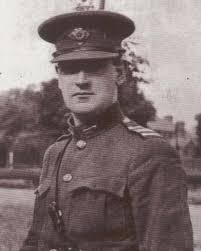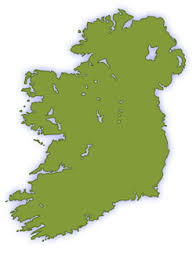Michael Collins (Irish: Míċeál Ó Coileáin;[1] 16 October 1890 – 22 August 1922) was an Irish revolutionary leader, Minister for Finance and Teachta Dála (TD) for Cork South in the First Dáil of 1919, Director of Intelligence for the IRA, and member of the Irish delegation during the Anglo-Irish Treaty negotiations. Subsequently, he was both Chairman of the Provisional Government and Commander-in-chief of the National Army.[2] Throughout this time, at least as of 1919, he was also President of the Irish Republican Brotherhood, and, therefore, under the bylaws of the Brotherhood, President of the Irish Republic. Collins was shot and killed in August 1922, during the Irish Civil War.
Although most Irish political parties recognise his contribution to the foundation of the modern Irish state, supporters of Fine Gael hold his memory in particular esteem, regarding him as their movement's founding father, through his link to their precursor Cumann na nGaedheal. TAOISEACH ENDA Kenny yesterday pledged the Government would not rest until Ireland has reclaimed its economic sovereignty and achieved the future for it envisaged by Michael Collins more than 90 years ago.
Mr Kenny told the 90th annual Béal na mBláth commemoration he was certain Collins would have approved of the restructuring programme embarked upon by the Government to regain economic sovereignty.
“Here at Béal na mBláth, as Taoiseach, I give you my word that I will not rest, our Government will not rest, until Ireland has reclaimed and restored its economic sovereignty,” Mr Kenny said. “We will not cease in our painstaking, quiet but persuasive endeavours until Ireland has re-established the economic independence, so precious, so hard won, which is its right and its due.”
The first serving Taoiseach to deliver the oration at Béal na mBláth, Mr Kenny recalled the dark days of August 1922 when, following the death of Arthur Griffith, Collins was “assassinated here in the dust of west Cork, whence he came”. There is much truth in the assertion made by the British film producer Lord David Puttnam, in his address at Béal na Blá in 2007, that Collins was an example of a life suspended somewhere between history and myth. Puttnam also said he would go to his grave believing that had Collins lived he would have forged his own place alongside the likes of Nelson Mandela and Mahatma Gandhi, “men who, having freed their own people from the shackles of oppression, became icons for peace and reconciliation everywhere”.
There is much truth in the assertion made by the British film producer Lord David Puttnam, in his address at Béal na Blá in 2007, that Collins was an example of a life suspended somewhere between history and myth. Puttnam also said he would go to his grave believing that had Collins lived he would have forged his own place alongside the likes of Nelson Mandela and Mahatma Gandhi, “men who, having freed their own people from the shackles of oppression, became icons for peace and reconciliation everywhere”.
That last assertion is fanciful, particularly when the depth of feeling that caused the Irish Civil War is considered, and the fact that neither Collins nor his contemporaries had any idea how to free their fellow nationalists in Northern Ireland from “the shackles of oppression”. Puttnam, however, was hardly going to be measured in his comments. In the late 1980s, he played a role in bringing to fruition what became the 1996 Neil Jordan film Michael Collins, by commissioning Jordan to write the original screenplay. The film did much to promote the myth of Collins at the expense of others, most notably Eamon de Valera, and the film was almost cartoonish in its depiction of heroes and villains.
MAKING THESE observations is not about denigrating Collins. There is little doubt that he was an exceptionally talented and often brilliant organiser and strategist. In 2005, the provocative biography of Collins by the late Canadian historian Peter Hart offered new and measured perspectives on his career. Hart clearly demonstrated that Collins had nerves of steel and was brave, but he was primarily an outstanding administrator and a skilled and opportunistic networker rather than a trigger-happy macho soldier. When not badgering IRA soldiers to pull up their socks and stand on their own feet, he was expressing frustration at the ineptness of his fellow Sinn Féin ministers (with de Valera, with whom he worked very well before the signing of the Treaty, often mediating), and developing his spy network, members of which were forces in their own right and not just puppets of Collins. Collins wanted a short war, and could not master everything; no one person, as Hart acknowledged, directed or controlled the war. Collins was just capable or determined enough to work harder than everybody else, and de Valera had to remind him at one stage that “the almighty did not give everybody the ordered mind he gave you”. Collins was also a difficult and often petulant colleague, and during and after the Treaty negotiations he was very much led by Arthur Griffith. In the subsequent fallout from the signing of the Treaty, he consistently outclassed and outperformed de Valera. Of course, the divisions in the republican movement after the Treaty were painful and difficult, but decisiveness was one of Collins’s principal characteristics.
Collins wanted a short war, and could not master everything; no one person, as Hart acknowledged, directed or controlled the war. Collins was just capable or determined enough to work harder than everybody else, and de Valera had to remind him at one stage that “the almighty did not give everybody the ordered mind he gave you”. Collins was also a difficult and often petulant colleague, and during and after the Treaty negotiations he was very much led by Arthur Griffith. In the subsequent fallout from the signing of the Treaty, he consistently outclassed and outperformed de Valera. Of course, the divisions in the republican movement after the Treaty were painful and difficult, but decisiveness was one of Collins’s principal characteristics.  It should be acknowledged, however, that Collins shared many of the limitations, conservative attitudes and prejudices of his contemporaries. According to the esteemed historian of the War of Independence, Michael Hopkinson, while it is undoubtedly the case that Collinss successors on the pro-Treaty side lacked his charisma and popularity, and that the political comeback and dominance of de Valera from the late 1920s to the late 1950s tempered the perpetuation of the Collins myth, “there is little evidence that Collins had any great breadth of economic and social vision”.
It should be acknowledged, however, that Collins shared many of the limitations, conservative attitudes and prejudices of his contemporaries. According to the esteemed historian of the War of Independence, Michael Hopkinson, while it is undoubtedly the case that Collinss successors on the pro-Treaty side lacked his charisma and popularity, and that the political comeback and dominance of de Valera from the late 1920s to the late 1950s tempered the perpetuation of the Collins myth, “there is little evidence that Collins had any great breadth of economic and social vision”.
Although most Irish political parties recognise his contribution to the foundation of the modern Irish state, supporters of Fine Gael hold his memory in particular esteem, regarding him as their movement's founding father, through his link to their precursor Cumann na nGaedheal. TAOISEACH ENDA Kenny yesterday pledged the Government would not rest until Ireland has reclaimed its economic sovereignty and achieved the future for it envisaged by Michael Collins more than 90 years ago.
Mr Kenny told the 90th annual Béal na mBláth commemoration he was certain Collins would have approved of the restructuring programme embarked upon by the Government to regain economic sovereignty.
“Here at Béal na mBláth, as Taoiseach, I give you my word that I will not rest, our Government will not rest, until Ireland has reclaimed and restored its economic sovereignty,” Mr Kenny said. “We will not cease in our painstaking, quiet but persuasive endeavours until Ireland has re-established the economic independence, so precious, so hard won, which is its right and its due.”
The first serving Taoiseach to deliver the oration at Béal na mBláth, Mr Kenny recalled the dark days of August 1922 when, following the death of Arthur Griffith, Collins was “assassinated here in the dust of west Cork, whence he came”.
That last assertion is fanciful, particularly when the depth of feeling that caused the Irish Civil War is considered, and the fact that neither Collins nor his contemporaries had any idea how to free their fellow nationalists in Northern Ireland from “the shackles of oppression”. Puttnam, however, was hardly going to be measured in his comments. In the late 1980s, he played a role in bringing to fruition what became the 1996 Neil Jordan film Michael Collins, by commissioning Jordan to write the original screenplay. The film did much to promote the myth of Collins at the expense of others, most notably Eamon de Valera, and the film was almost cartoonish in its depiction of heroes and villains.
MAKING THESE observations is not about denigrating Collins. There is little doubt that he was an exceptionally talented and often brilliant organiser and strategist. In 2005, the provocative biography of Collins by the late Canadian historian Peter Hart offered new and measured perspectives on his career. Hart clearly demonstrated that Collins had nerves of steel and was brave, but he was primarily an outstanding administrator and a skilled and opportunistic networker rather than a trigger-happy macho soldier. When not badgering IRA soldiers to pull up their socks and stand on their own feet, he was expressing frustration at the ineptness of his fellow Sinn Féin ministers (with de Valera, with whom he worked very well before the signing of the Treaty, often mediating), and developing his spy network, members of which were forces in their own right and not just puppets of Collins.

No comments:
Post a Comment